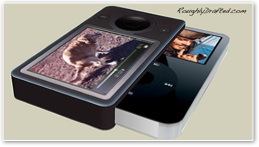
Strike 3: Why Zune will Bomb this Winter
With so much failure already under its belt in the consumer electronics arena, Microsoft certainly hopes its new iPod Killer will make a strong showing this holiday season. Still, analysts aren't afraid to articulate exactly why they think the Zune will fail.
 The Microsoft iPod-Killer Myth already outlined why Microsoft's overall online media strategy has tanked so far, but the Zune faces three additional strikes this winter that will prevent it from making any headway in its goal to unseat the iPod.
The Microsoft iPod-Killer Myth already outlined why Microsoft's overall online media strategy has tanked so far, but the Zune faces three additional strikes this winter that will prevent it from making any headway in its goal to unseat the iPod. The Zune Assault on Fair Use
This is an important issue for anyone interested in future fair use rights, because Microsoft has forfeited the Zune to music label interests, and is branding all music player users as thieves who deserve to pay an extra piracy tax to RIAA labels.
As Blackfriars pointed out: “that's a nice way to make Apple pay for Microsoft entering this market. This is classic Microsoft: crafting deals to attack competitors instead of spending the time and energy to positively market the product uniquely and powerfully.”
Fortunately, Microsoft’s evil is currently being tempered by its gross incompetence in engineering and marketing the Zune. Consider the following three strikes facing the Zune this holiday season, and then share your own perspective on things in the comments below.
Apple's Winter iPod Sales Strategy
To evaluate the Zune's sales potential this winter, take a look at Apple's historical seasonal shift in iPod sales and compare actual iPod sales to the company's ongoing winter sales strategy. Incidentally, this is what Microsoft should have done a year ago as part of its iPod-Killer strategy plan.
Apple has historically sold a lot of iPods during the winter holiday season, which represents its fiscal first quarter. Last winter's 2005 results, for example, were published by Apple in its Q1 2006 earnings.
It's no surprise that Apple sells a lot of iPods during the holidays, but the consistent proportion of holiday sales to the rest of the year is arresting:
-
•In 2002, Apple sold nearly as many iPods in its winter quarter (219,000) as it did the first three quarters.
-
•In 2003, Apple actually sold more iPods in its winter quarter (733,000) than in the first three combined.
-
•In 2004, Apple again sold more iPods in its final quarter (4,580,000) than in the first three.
-
•In 2005, Apple maintained sales of more than 4 million iPods in every quarter. In the winter quarter, it still blew out nearly 3 times as many: 14,480,000.
-
•This year, Apple maintained iPod sales of more than 8 million in each of the first three quarters of the year.
Despite this insane growth, analysts were quick to scrape together the the most painfully transparent FUD yet, suggesting that iPod sales were in trouble and that the winter rush in sales in the final quarter of last year was no surge, but rather a last hurrah for a dissipating fad.
In reality, the reason these analysts sparked a conversation about iPod sales “dropping” was because they were reading sales figures backwards; Apple’s fiscal “Q1” is the final quarter of the previous year. They were reading upside down.
In reality, Apple’s iPod sales consistently surge 300% during the winter quarter. That progressive compounding results in huge numbers that are hard to fathom. If all the talk of millions has your eyes glossing over, here are...
Some Numbers For Comparison
For some perspective, CNet recently gushed about PDAs and smartphones in the article Smart-phones Sales are Soaring. In it, Gartner reported annual worldwide sales of 37.4 million smartphones and 7.4 million PDAs.
In Gartnerland, PDAs can also be phones, so its PDA numbers include many hybrid phone devices one would reasonably consider a smartphone instead. Still, Apple shipped more of its iPods in every quarter of this year than the entire PDA industry sold in an entire year.
Another angle: Since 2001, Apple took a product category that barely existed and built it out into profitable, sustainable new platform. In five years, Apple has sold 60 million iPods and consistently surpassed sales targets.
In the same time period, Microsoft's significantly cheaper Xbox has never been profitable and never hit its sales targets. Microsoft has lost over a billion dollars while only shipping 24 million units in the last five years.
So despite all the talk from self appointed experts, Apple’s growth isn’t really headed backward, and the iPod isn’t just ad hype: it’s an ecosystem that is far larger than Microsoft’s entire PDA and Xbox initiatives combined.
So what about the Zune? Discovering the truth requires understanding how misinformation campaigns work, and how individuals and corporations use Astroturfing to undermine the truth. The Digg Fraud Campaign Behind Zune highlights how this works.
Apple's Winter Strategy
This winter quarter Apple will no doubt sell a lot of iPods, but its hard to imagine how the company could again reach nearly three times the number of iPods already sold this year in its final quarter, as it has for the previous four years.
Actually, there's only one way that Apple could even come close: sell really cheap iPods. Cheap iPods have always been the fuel behind Apple's previous blockbuster winter quarter sales. This strategy will be strike number one against the Zune.
Strike One: Cheap Gifts
People frequently give cheaper items for gifts than they would invest in a single luxury item for themselves. During the first three quarters of the year, sales largely represent consumers buying devices for their own use. For Apple, that means more high-end iPods.
In every holiday quarter, Apple sells far more units, but its reported revenue and profits indicate that the company is achieving its growth in the final quarter by selling a larger volume of cheaper devices.
Last year, Apple's release of the new Nano along with the Shuffle boosted Apple's winter quarter iPod sales through the roof, well past all expectations.
This year, Apple followed the same strategy. Rather than releasing the flashy, high end, video-centric iPod fantasy invented by the rumor mill, Apple announced a smaller, cheaper Shuffle; a new lineup of Nanos; and only a basic refresh of last year's full size iPod.
Since that introduction, Apple has spent most of its advertising budget promoting the Nano, including involving it in the (Product)Red campaign.
Clearly, Apple plans to sell lots of the tiny new Shuffles and Nanos. These products compete against cheaper flash players, but it's hard to get cheaper than the new $79 Shuffle, or match the tight engineering of the Nano.
So during the peak time for buying gifts, consumers will be hard pressed to find music players competitive with what Apple is pitching the hardest. The primary alternative to the Nano is the second place SanDisk Sansa, which has carved out for itself the largest piece of the non-iPod pie by following Apple's low cost strategy.
Swing and a Miss
The Zune, however, is priced at the top of the scale, making it a pricey gift. It costs the same as Apple's full sized iPod, making it a luxury purchase which people are more likely to buy for themselves.
In targeting only the middle segment of the top end iPod, Microsoft has surrendered the entire mass market to Apple during the prime gift giving season. Oops!
At its initial debut, just as Microsoft needs some impressive sales numbers to present the Zune as a potential iPod rival and not another black eyed failure, it will be passed over by consumers looking for affordable gifts.
After the holidays, there will be an even larger installed base of iPod users, more iTunes customers, and greater interest in the iPod's new cousin, the iTV, making it harder still for Microsoft to push its Xbox 360, Zune, and exploding media Marketplace rental store combination. Oh the humanity!
Strike Two: A Glutted Market for WinCE Form Factor Devices
With the Zune, Microsoft hopes to compete against the full size iPod, which still offers a larger capacity in a smaller form factor. The Zune is as boxy as a book.
Microsoft apparently doesn't understand why Apple packaged the iPod in a rounded, shiny metal case: it creates an illusion that the iPod is actually smaller than it is. The rounded edges fit the hand better, and make it easier and more comfortable to slide into a pocket.
As Gartner's PDA numbers cited above demonstrate, there is a limited worldwide potential for PDA sales. Everyone already has a phone, plenty have an iPod, but only a small fraction are interested in carrying around another big box, regardless of how fancy its features might be. Apart from a few curiosity sales, the Zune simply isn't going to sell because its too friggin’ big and clumsy to carry around.

TV's were fit into a handheld package a decade ago, and PDAs that pack impressive processing power are nothing new. The real barrier that has prevented little TV/computer devices from getting sold in any quantity is that these have no realistic or practical applications that outweigh having to carry them.
The iPod not only fits into a pocket, but it's happy to hide in one. Apple has avoided putting a larger display on the iPod for precisely the same reason. When the iPod becomes a multifunction device with a large display, it will stop being a music player and convert to being a PDA that also happens to play music.
WinCE and Cringe
In Microsoft's world, that's what a music player has always been. The Zune, just like its cousin PlaysForSure devices, isn't an embedded device designed primarily to play music, like the iPod is. Instead, it's just a WinCE based PDA that plays music.
More precisely, it's a recycled WinCE device that failed as a PDA, failed as a music player for Toshiba, and is now hoping to not fail in its third incarnation as an clunky, oversized music player running a slimmed down, general purpose operating system with all the stability and performance of Microsoft's desktop OS.

So not only is the Zune priced too high to participate in the mass market as a popular gift this winter, but it’s also a tired boxy shape that will have to compete in the tiny niche market for WinCE PDAs, just when all the other oversized PlaysForSure devices are getting dumped into the market. Oops!
That's right: now that Microsoft has abandoned its former music hardware partners, they will all be trying to unload their inventory of Microsoft designed, clunky WinCE based players on consumers as they stampede away from the PlaysForSure failure.
Microsoft has overpriced its product during a fire sale of its own making!
Strike 3: The Neutered Network
In an apparent effort to further handicap the Zune, Microsoft equipped it with a radio transmitter that ensures the device will burn through battery life faster than any music player in recent history.
Paired with a larger screen that is designed to be lit up more often than not to display wallpaper photos, the Zune is in many ways the opposite of the iPod, which is optimized to shut off the screen and coast along in low power mode through aggressive RAM caching of its hard drive.
No doubt some early reviewers will be fooled by Microsoft's advertised battery life figures, but consumers are much harder to keep happy. The most grievous complaints about the iPod were from users who assumed its battery would last longer and never wear out.
Initial battery complaints were further complicated by Apple's delayed efforts to provide replacement batteries at a reasonable price. But years after Apple figured out how to solve the problem, why is Microsoft making the same ones?
Anyone suckered into owning a WinCE device knows that their battery life blows chunks. This isn’t because Microsoft doesn't have access to modern technology, but is rather due to the company’s inability to say no to features that aren’t useful.
A major part of effective engineering involves tough decisions on what not to include; Microsoft is not good at this. The result is a device that does everything, but poorly. The Zune will introduce users to a new experience: music players that frequently crash. There is no way avoid that when the system it runs is simply too complex.
Music Industry Sellout
Of course, the bigger problem with the Zune's wireless radio transmitter isn't just that it kills battery life, but that it doesn't do anything useful for users. It’s a gimmick, and is hampered by Microsoft’s kowtowing to the RIAA.
The unit's ridiculous DRM scheme forces all media to explode after three partial plays or three days, even if it is not a protected track. It also prevents anyone from sharing anything they've been squirted.
Considering that the value of a network is directly proportional to the number of linked members of the network, the draconian restrictions of the Zune, paired with the battery stabbing effects of its radio, means that motives and opportunities to use its networking features will be constrained to the point of uselessness.
It's like paying extra for a cell phone that can only call Gilbert Gottfried. What the heck is Microsoft thinking?

A Clear and Present Danger
Microsoft’s looming disaster of Zune sales this winter should alarm investors, but it’s continued efforts to promote the anti-consumer tactics of the RIAA and greedy music executives should give potential Zune enthusiasts something to seriously consider:
The Zune isn’t just a iPod rival, it’s part of Microsoft’s efforts to further enslave consumers to a profit engine designed to suit the desires of the music industry, ignore consumers’ fair use rights, and destroy open content.
Next Articles:
This Series










Saturday, November 11, 2006


 Bookmark on Del.icio.us
Bookmark on Del.icio.us Discuss on Reddit
Discuss on Reddit Critically review on NewsTrust
Critically review on NewsTrust Forward to Friends
Forward to Friends
 Get RSS Feed
Get RSS Feed Download RSS Widget
Download RSS Widget





